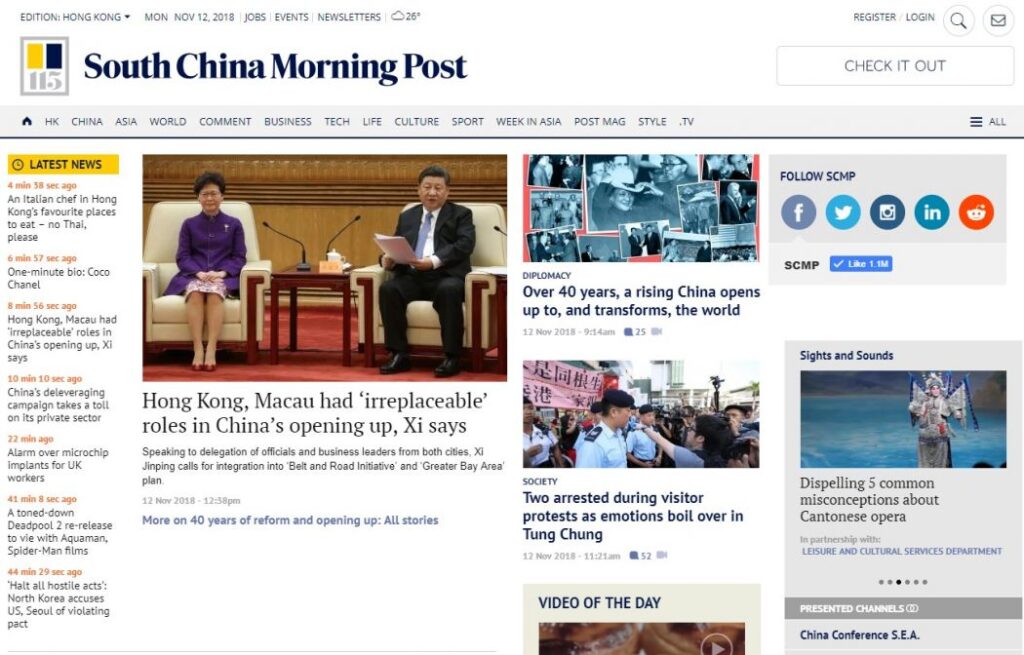After years of contributing to the South China Morning Post, I’ve decided to step away. Ironically, it was a petty dispute that pushed me to make the final call. But in truth, this decision should’ve been made back in February—for reasons far more serious.
That was when the Post chose to play a disturbing role in what was clearly a state-orchestrated attempt to discredit Gui Minhai, the bookseller who was kidnapped and imprisoned for selling material in Hong Kong that embarrassed China’s leadership.
What unfolded was no ordinary interview. It was the third of Gui’s staged “confessions”—the kind you’d expect in a dictatorship, not from a man speaking freely. The Post, which claims editorial independence, became an accessory in a grotesque political performance, providing cover and credibility to a man held under duress.
We’ve seen this before—in the darkest chapters of history. During China’s Cultural Revolution, confessions were extracted under pressure and blared through loudspeakers. In Stalin’s Soviet Union, the tactic was perfected: public humiliation masked as repentance, all to crush dissent. But the trick to effective propaganda isn’t just force—it’s the illusion of neutrality. That’s where so-called “independent” media come in.
Gui, like others before him, was given a bleak choice: suffer in silence for years or publicly “confess” in exchange for leniency. The Post was one of the platforms used to showcase this manufactured contrition. The editors attempted to justify their involvement, claiming no conditions were attached to the questions asked. But by publishing the story without context, they helped legitimize a farce.
In doing so, the Post crossed a clear line. Every journalist knows that independence comes with compromises—especially in a one-party state—but there are boundaries. Collaborating with authoritarian propaganda isn’t a grey area. It’s a red line.
The CCP knows this, too. It understands that state-run outlets like People’s Daily are met with skepticism internationally. But when an English-language paper with a reputation for independence parrots the party line, it becomes a far more effective tool for influence abroad.
This isn’t a tactic exclusive to China. The U.S. government dabbled in similar games during the Cold War. But the SCMP’s involvement today is particularly troubling because of what the paper once stood for—and what it is rapidly becoming.
Since Alibaba took ownership, under China’s richest man Jack Ma, the paper has leaned heavily into the CCP’s messaging. It now serves a dual function: to present a more polished image of China to the world, and to counter unfavorable narratives from Western media. This shift isn’t about profit. In fact, the paper is losing money. But those losses are a small price for Alibaba to pay if it helps keep Beijing happy.
The SCMP’s strategic use of English and its long-standing presence in Hong Kong—once a bastion of press freedom—give it real value to China’s messaging machine. It’s no secret that Beijing seeks a larger voice in global discourse. The Post is simply one of its more presentable megaphones.
Of course, this isn’t entirely new. When the Kuok family owned the Post, there were whispers that they took it on at Beijing’s request ahead of the 1997 handover. Robert Kuok, the Malaysian tycoon with deep business ties in China, was said to have made the acquisition as a favor. Before that, when Rupert Murdoch’s News Corp ran the show, the paper was a profit machine. But Murdoch, always the strategist, offloaded it when he sensed the political climate shifting—and when the price was still high.
The Post’s history has always been political. Under British rule, it was a mouthpiece for colonial officials. That legacy has been quietly edited out of its recent anniversary coverage. Today, the paper wears a split identity: high-quality investigative journalism side-by-side with front pages lauding China’s global rise. Critical voices have been scrubbed from the opinion section, replaced with dull, predictable commentary—some of which seems to exist solely to undermine Hong Kong’s pro-democracy movement.
There are still a few bold writers left at the Post. But they walk a fine line, knowing full well that crossing it could cost them their platforms—or their jobs.
Meanwhile, coverage of Hong Kong itself has been pushed to the margins. Local news is buried or removed from the main section. And the editorial decision to refer to Hong Kong solely as a “city” instead of a “Special Administrative Region”—its legal status under the Basic Law—is telling. It suggests a quiet but deliberate editorial realignment in step with the party’s preferences.
Despite these shifts, the Post maintains an illusion of independence. But that illusion collapses when it chooses to act as a vessel for the darkest tools of authoritarian propaganda.
As for me, I’ve been in journalism long enough to know what happens when credible institutions wade too deep into dangerous waters. You start by compromising. Then you normalize. And eventually, you find yourself complicit.
My years with the SCMP were once a point of pride. Now, that association feels more like a liability. And I can no longer ignore what the paper has become.
It’s time to move on.

